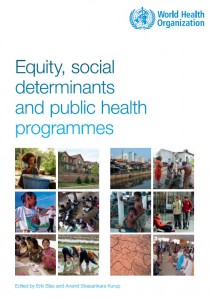 I’ve just familiarised myself with WHO’s publication “Equity, social determinants and public health programmes“. It was written in 2010 with a view to drawing lessons from the WHO Global Commission on Social Determinants in order to think further upstream than the traditional public health programmes.
I’ve just familiarised myself with WHO’s publication “Equity, social determinants and public health programmes“. It was written in 2010 with a view to drawing lessons from the WHO Global Commission on Social Determinants in order to think further upstream than the traditional public health programmes.
I have to say I struggled to start with. I always groan a little when I see documents about ‘public health’ where the chapter headings are the ‘usual’ suspects – diseases such as cardiovascular disease; diabetes; mental disorders and ‘lifestyle behaviours’ such as alcohol; tobacco; diet. My worry is always that this silos people into thinking of the determinants of each of these ‘usual’ suspects without considering the crossovers between them – what you then get is practitioners fighting for the attention of different stakeholders on a disease by disease or risk by risk basis. Just recently I was at a WHO European Healthy Cities Network conference where there were calls to move away from that perspective to think more holistically about what creates health.
But I thought I’d persevere, after all – equity and social determinants were in the title. And I’m glad I did. In essence the introductory chapter introduces a common analytical framework to consider inequities in major public health priorities i.e. usual suspects (more later). Then this framework is applied in each of 11 chapters to all those ‘usual’ suspects. Then in the final chapter – yeah – they synthesise the findings across the whole lot and highlight those social determinants that should be addressed in order to have an effect across a substantial number of all those ‘usual’ suspects. In other words, they recommend working upstream in an integrated, holistic way – rather than a disease by disease or risk by risk way.
